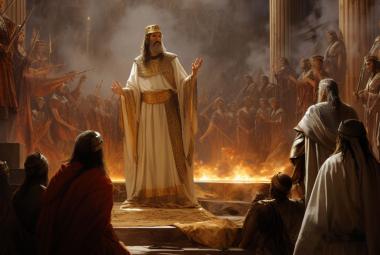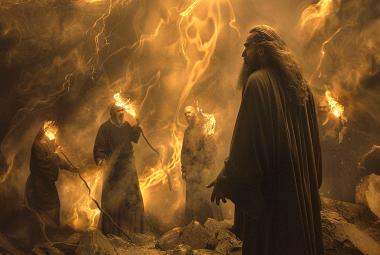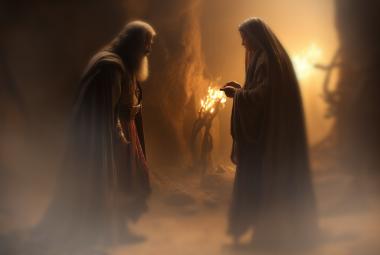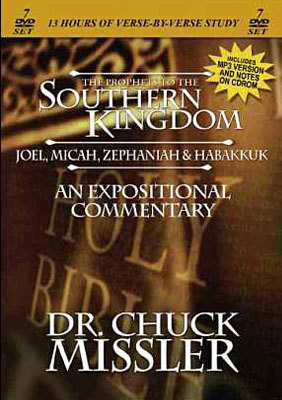The burden which the prophet Habakkuk saw. The Prophet’s Question: O Lord, how long shall I cry, and You will not hear? Even cry out to You, “Violence!” And You will not save. Why do You show me iniquity and cause me to see trouble? For plundering and violence are before me; there is strife, and contention arises. Therefore the law is powerless, and justice never goes forth. For the wicked surround the righteous; therefore perverse judgment proceeds.
Habakkuk 1:1-4
The prophet Habakkuk opens his short book, not proclaiming God’s word to man, and instead shares his lament with God. All around him was chaos and injustice. Along with the book of Job, the books’ namesakes challenge God and his dealing with a man (Job) and his dealing with a people (Habakkuk.) Today, with great need and call to guard (or keep) our hearts (Proverbs 4:23), much can be learned from these two books. This month’s article focuses on the three-chapter book Habakkuk.
Like Job, Habakkuk questions God in very pointed and pressing language. The “how long” question is surely asked of God by His people throughout the centuries. Those enslaved by Egypt must have wondered when their God would deliver them – we know it took four hundred years. (see Genesis 15:13 and Acts 7:6)
God hinted at the virgin birth of the Messiah in Genesis and confirmed it through the words of Isaiah. But why did it take so long from the promise to the birth of Jesus?
And I will put enmity between you and the woman, and between your seed and her Seed; He shall bruise your head, and you shall bruise His heel.”
Genesis 3:15
Therefore the Lord Himself will give you a sign: Behold, the virgin shall conceive and bear a Son and shall call His name Immanuel.
Isaiah 7:14
And today God’s people early await the fulfillment of over two thousand end-time prophecies. The Bible even talks about the delay in Jesus’ return describing it as a sort of normalcy bias among its skeptics.
(S)coffers will come in the last days, walking according to their own lusts, and saying, “Where is the promise of His coming? For since the fathers fell asleep, all things continue as they were from the beginning of creation.”
2 Peter 3:3b-4
This generation, more than ever, is described as an impatient one, wanting instant satisfaction and immediate results. The life of the farmer who plants in the spring and harvests in the fall is replaced by tapping on a mobile phone app and having fruit and veg delivered later the same day. For those who wait and wait and wait with seemingly Nobody listening or Nobody answering, the heart grows sick and the hands grow weak
Hope deferred makes the heart sick, but when the desire comes, it is a tree of life.
Proverbs 13:12
And let us not grow weary while doing good, for in due season we shall reap if we do not lose heart.
Galatians 6:9
So Habakkuk captures in the first few verses the condition of mankind throughout all human history – impatient, fearful, nervous, uncertain. These are all conditions of the heart from which physical symptoms can emerge – green stomachs, hypertension and sleeplessness. And God’s answer to Habakkuk may not do much to relieve them.
Look among the nations and watch— Be utterly astounded! For I will work a work in your days which you would not believe, though it were told you. For indeed I am raising up the Chaldeans, a bitter and hasty nation which marches through the breadth of the earth, to possess dwelling places that are not theirs. They are terrible and dreadful; their judgment and their dignity proceed from themselves. Their horses also are swifter than leopards, and more fierce than evening wolves. Their chargers charge ahead; their cavalry comes from afar; they fly as the eagle that hastens to eat.
Habakkuk 1:5-8
The Lord’s reply amounts to, “You have not seen anything yet!” “Your circumstances will get far worse before they get better.” “I will use the wicked, violent, unrighteous, ungodly enemy to do My work.” Hardly words of comfort, but what follows is an amazing conversation back and forth between God and Habakkuk. It is well worth your time, Gracious Reader, and in Habakkuk’s words, you might hear your own thoughts as you survey the current landscape. For brevity and focus, the following verses close the book and serve as “Habakkuk’s Hallelujah.” The futility of arguing with God is replaced by the majesty of worshipping Him. Habakkuk no longer insists on answers to his questions or influence over God’s plan. Instead, he bursts into a beautiful doxology that is familiar to many.
Though the fig tree may not blossom, nor fruit be on the vines; though the labor of the olive may fail, and the fields yield no food; though the flock may be cut off from the fold, and there be no herd in the stalls— Yet I will rejoice in the Lord, I will joy in the God of my salvation. The Lord God is my strength; He will make my feet like deer’s feet, and He will make me walk on my high hills.
Habakkuk 3:17-19
Despite his present circumstances, Habakkuk will rejoice. Despite his future calamity, Habakkuk will be joyful. Despite the apparent victory of his enemy, Habakkuk knows the Lord is strong and mighty. Deer walk over a slippery stream with sure-footed confidence. The internet provides many videos of deer walking along near vertical cliffs. God gives us the surefootedness we need in difficult times.
He makes my feet like the feet of deer, and sets me on my high places.
Psalm 18:33







